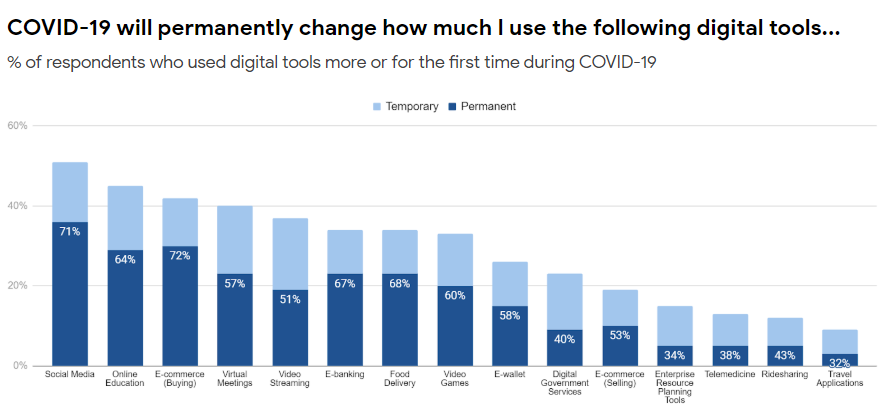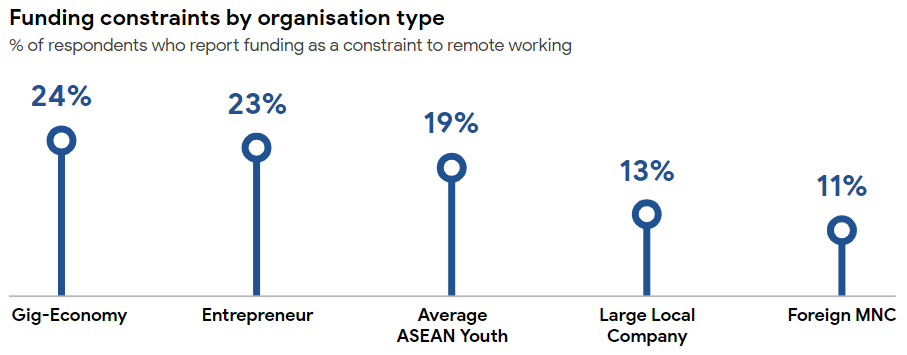- Survey of almost 70,000 youths in the ASEAN region revealed strong growth mindsets as they picked up new skills, learned how to think creatively, created new sources of income, and developed pandemic resilience.
- ASEAN youths significantly increased their digital footprint, with the majority confirming this will be a permanent shift in behaviour beyond the COVID-19 pandemic. Indonesia and Singapore generally saw a greater increase in digital adoption.
- Lack of digital skills and access to affordable and quality internet connection were the most binding constraints for remote working/studying.
Singapore, July 23, 2020 – Despite the unprecedented challenges from the COVID-19 pandemic, ASEAN youths are displaying strong growth mindsets to emerge more resilient and adaptable. This is according to Sea’s ASEAN Youth Survey 2020, published in partnership with the World Economic Forum (WEF) to understand and assess the impact of social distancing on youth.
Emerging More Resilient and Adaptable

In a survey of almost 70,000 youths aged 16 to 35 across the ASEAN region, almost three-quarters (72%) demonstrated resilience and adaptability during the pandemic, by either building up their pandemic preparedness (48%), picking up new skills (41%), learning to think creatively (38%), or creating new sources of income (31%).
Youths exhibited different shades of resilience and adaptability, with full-time students more likely to adopt new skills; entrepreneurs more likely to develop new business models to expand their sources of income; and active workers more likely to develop their pandemic resistance.
“With the challenges caused by the pandemic, ASEAN youths displayed their resilience and adaptability, showing great promise for recovery and responding to future crises in the larger world of work,” said Santitarn Sathirathai, Group Chief Economist of Sea.
Looking closely at the data, more women enhanced their skill sets than men during the COVID-19 pandemic. Almost two in three women (63%) reported learning how to better manage their budgets compared to slightly over half of men (53%), with the same proportion of women (63%) becoming more conscious about the value of emergency savings compared to less than half of men (47%).
A Permanent Shift to Digital for the Majority of Youths
ASEAN youths adapted to the COVID-19 environment by significantly increasing their digital footprint. 87% of respondents increased usage of at least one digital tool during the pandemic, while 42% picked up at least one new digital tool. Indonesia and Singapore saw a bigger increase in digital adoption, with more than 50% of youths in both countries reporting a rise in e-commerce buying behaviour.
Entrepreneurs switched distribution channels and went online to increase their sales during the COVID-19 pandemic. 33% of entrepreneurs used e-commerce selling more actively during the COVID-19 pandemic, with one in four using it for the first time.

A majority of youths confirmed that they will permanently increase their use of digital tools even after the pandemic. More than 60% said that they would permanently increase their usage of social media, e-commerce, online education, e-banking, and food delivery.
“With the widespread shift in online lifestyles, we saw the rapid acceleration in digitalisation further driving the demand for digital tools and skill sets,” said Sathirathai.

A Lack of Digital Skills and Access to Affordable Internet were the Most Binding Constraints
Adjusting to the COVID-19 environment was a challenging process for ASEAN youths. More than two-thirds (69%) found it difficult to work or study remotely during the pandemic, including 7% who said it was impossible. The top binding constraints on remote working or studying were the shortage of digital skills (84%) and a lack of access to affordable and quality internet connection (79%). While neither of these constraints was the most commonly cited by the majority, they are the most ‘binding’ in the sense that they were the most mentioned by youths who struggled with remote working.
Almost one in five (19%) of respondents also reported lack of funding as a key barrier. Among them, gig economy workers (24%) and entrepreneurs (23%) faced the greatest funding challenges.

Sathirathai added, “It is inspiring to see the resilience and adaptability youths in ASEAN have shown in the face of these unprecedented challenges. Nonetheless, our analysis clearly highlights the need for the public and private sectors to come together to support our youths – to raise their digital skills, remove barriers to internet access, and increase access to funding. Only then, will our leaders of tomorrow be able to unlock their full potential.”
The ASEAN Youth Survey was developed by Sea Insights, Sea’s research and public policy unit, in partnership with the WEF. The survey polled users of Sea’s e-commerce platform, Shopee, and digital entertainment arm, Garena from 6 ASEAN markets – Indonesia, Malaysia, the Philippines, Singapore, Thailand, and Vietnam.
For enquiries, please contact: media@seagroup.com

